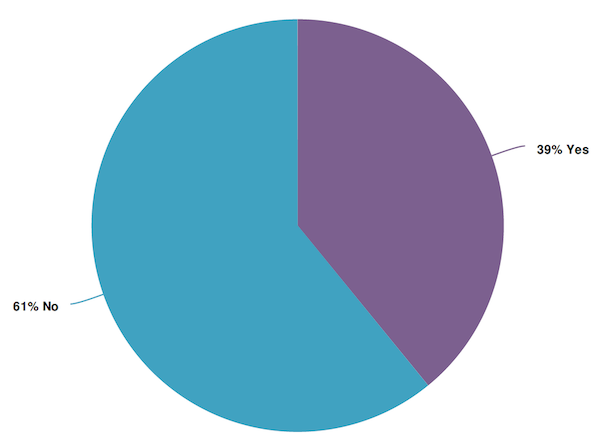Fuel COVID-19 Consumer Sentiment Study Volume 2: What Changes Are We Seeing?
by Cassey Reynoso
As we begin to look forward to recovery, there is so much uncertainty surrounding timing and demand. Some of the most common questions that people are asking are “When will things start to get back to normal?” and “when should I start ramping up my advertising?” As an industry thought leader, we decided to perform this study in order to gain insight into the consumer and to provide hoteliers with a benchmark from which we can gauge recovery. Given the sample size for these surveys, this report constitutes one of the most thorough and comprehensive reports on consumer sentiment. We hope that you find the information useful
Fuel recently fielded a second study to North American leisure travelers regarding their perceptions and fears related to travel during the COVID-19 crisis. The survey was sent out on April 16, 2020, and received more than 10,000 responses. Below is a summary of the findings, along with some observations and opportunities that arise from the results. The first study can be found here.
1. How many vacations do you typically take each year?

- Observation: Surprisingly more people answered with 2 vacations per year than 1.
- Opportunity: This is good news, since it’s very possible that even at this point in the year, you would have consumers waiting on that second vacation (or the first one, that might have been cancelled) and are primed to book.
2. Have you had a trip affected by the Coronavirus outbreak?

- Observation: Nearly 70% of respondents have either canceled or rescheduled a trip, with cancellations outpacing rescheduling by 4:1.
- Opportunity: A large number of people have yet to cancel a future trip. Being proactive with these guests by reaching out and offering to reschedule for free would potentially reduce the risk of losing these guests altogether. We have also seen success from properties who call the canceled guests and offer to rebook them with added incentives and a no-risk cancellation policy.
- Data Comparison: Both cancelations and rescheduled trips increased compared to our last survey. Combined they now sit at 66%, an increase of 18% in just 2 weeks. These results follow two weeks of increasingly bad news in terms of infection rates and deaths as a result of the virus, along with the announcement of beach closings in many popular destinations in Florida and all along the East Coast.
- Resource: On this episode of our podcast, Kelly Simmons, Director of Marketing for 14 resorts discusses how they have significantly reduced the number of cancellations by implementing an outbound call strategy: Fuel Hotel Marketing Podcast: Episode 141 – A Hotelier’s View On How To Market During The COVID-19 Crisis (with Kelly Simmons)
3. As a result of the coronavirus situation, which best describes you?
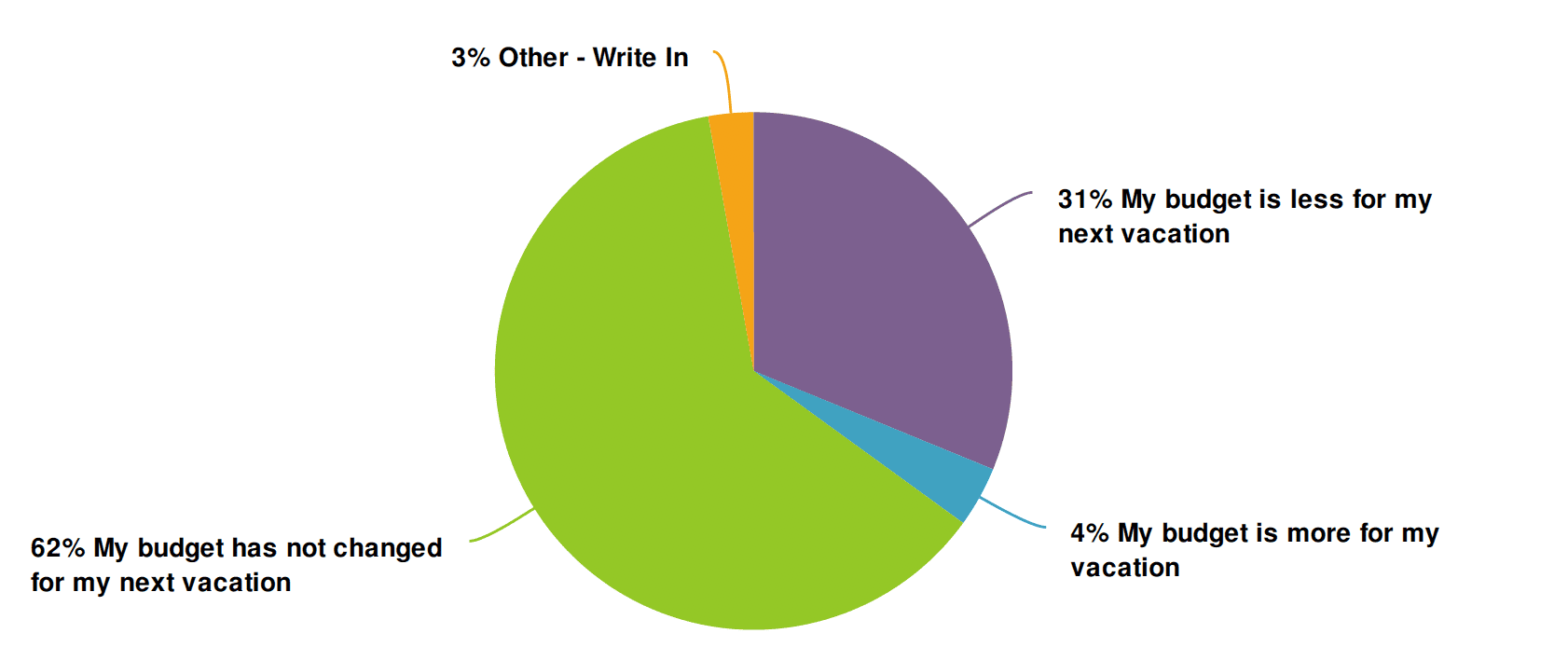
- Observation: 62% claim that their budget for travel is unchanged, while 31% say that it’s reduced.
- Data Comparison: This is a bit surprising, as the percentage of people saying they will spend less is shrinking. Last survey, 38% of respondents said they would spend less. These results could be impacted by several factors, including the receipt of stimulus checks from the U.S. government, along with an increase in certainty and job security as the economy begins to open up
- Opportunity: While this change is a positive signal, we can’t discount this 31% of the population. Providing value-added packages will increase the chance of getting some of this business versus not getting any of it.
- Resource: We did an amazing podcast with our friends at Milestone where we discussed the things hoteliers should be focused on right now: Fuel Hotel Marketing Podcast: Episode 142 – Now Is The Time: What Should You Be Doing Right Now (with Tammy Carlisle from Milestone)
4. How will coronavirus likely affect the length of stay for your next vacation?

- Observation: Less than 30% said that their length of stay would be affected at all. However, most of those that are likely to change their stays, will be staying for a shorter length of time.
- Opportunity: By offering both longer and shorter package pricing, you will increase the chance of converting both types of travelers.
5. How will coronavirus likely affect the type of property you choose for your next vacation?

- Observation: With 30% of people saying they will be spending less on their vacation, it is not surprising that 22% answered that they will likely stay at a more affordable property.
- Opportunity: Again, any type of added value that can be included in a stay will help persuade these potential guests. Gift cards for gas, 2 breakfasts included per stay, Starbucks gift card or free coffee from your on-site coffee shop are examples of a few low-cost items.
6.How soon after the restrictions are lifted will you be willing to make the following
trips?
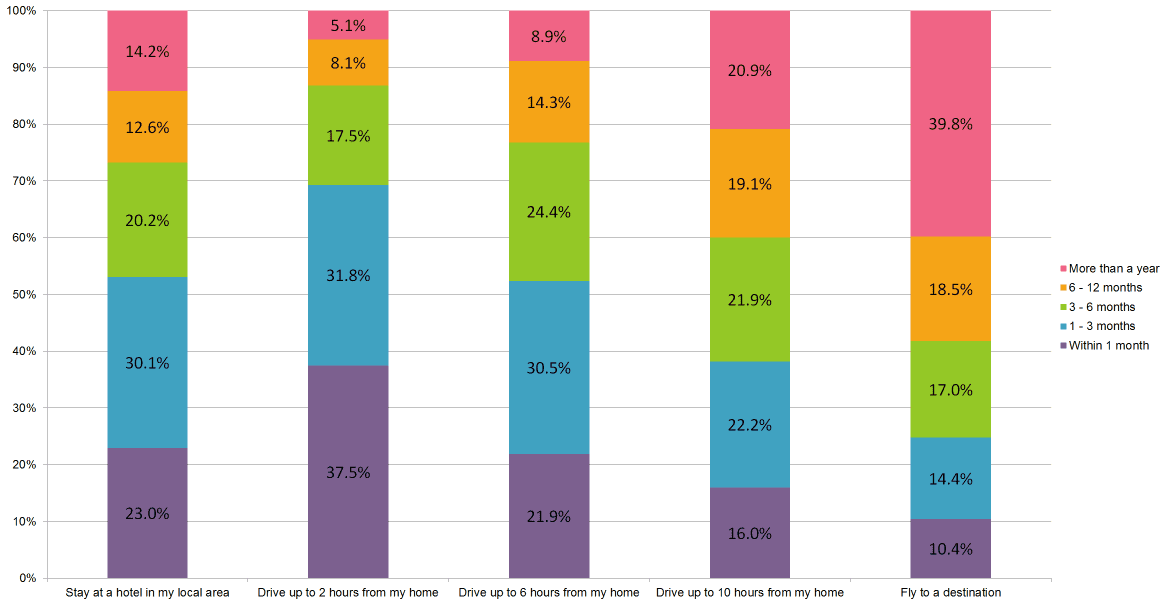
- Observation: For distances up to 6 hours of driving, at least 50% of consumers will be ready to travel within 3 months of restrictions being lifted. Flying comprised just 29% within a 3 month window.
- Opportunity: The 2 hour drive market is the most confident for traveling sooner rather than later, with 38% ready to travel within a month of restrictions being lifted, and 32% from 1-3 months. For the near future, targeting these consumers via email and paid search will yield the best returns.
7. How soon after the restrictions are lifted will you be willing to travel to the following types of destination?
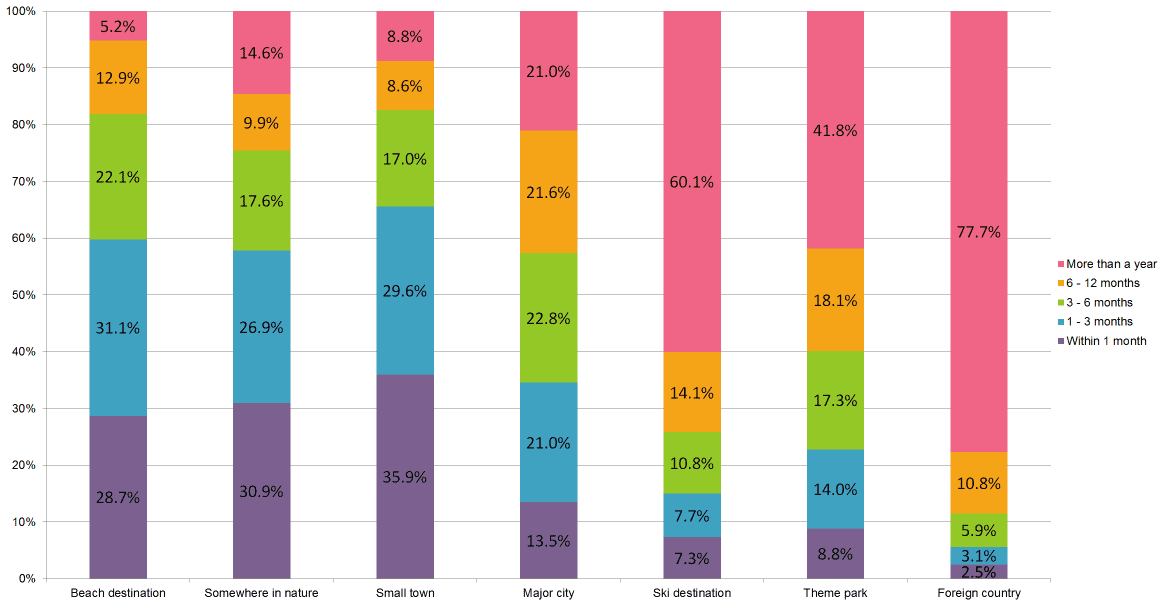
- Observation: Destinations with opens spaces were more likely to be visited earlier than densely populated areas, ski destinations, or foreign travel.
- Opportunity: For open area destinations, summer bookings are very plausible. For major cities, even though the numbers are smaller within the first 3 months, it’s still 35% of respondents. Using smart targeting will prove to have the best results.
- Resource: Take a look at your analytics for insight as to what your consumer is looking for vs. booking. What COVID-19 Means for Your Analytics Data
8. Which of the following would most likely persuade you to book a future vacation during the coronavirus outbreak? (Check all that apply)

- Observation: With so much uncertainty about the virus, it is not surprising that nearly 60% of people chose flexibility to change without penalty, and more than 40% chose travel insurance.
- Data Comparison: People saying that they could not be persuaded decreased from 37% to 28%! Flexibility to change increased from 48% to 58%, and travel insurance increased from 27% to 41%. Discounts and added value showed increases, as well as reassurance of sanitizing.
- Opportunity: Clearly stating your cancellation policy and safety efforts, as well as any changes you have made to it in all marketing efforts is critical.
- Resource: Fuel put this article together on what types of policy changes and messaging you should be implementing right now: The Definitive Guide To COVID19 Policy Updates & Communication
9. During the outbreak, I would like to hear from hotels on the following topics: (check all that apply)
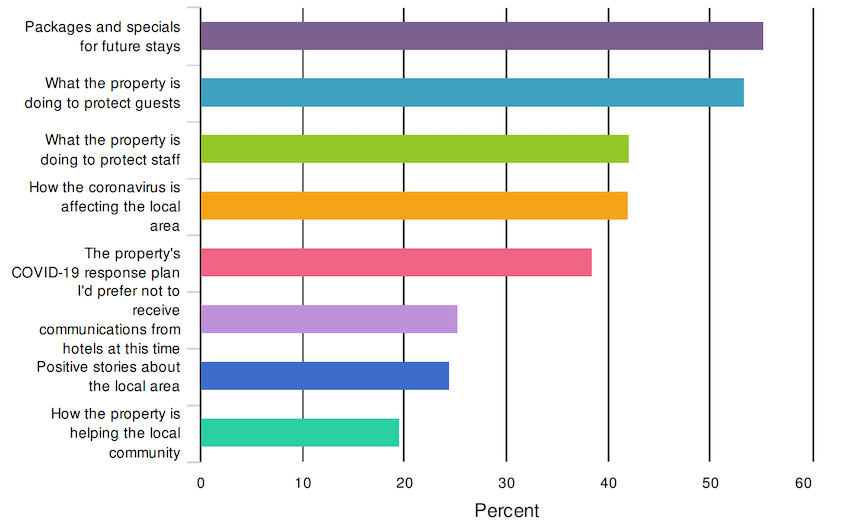
- Observation: Respondents were nearly as interested in learning about what properties are doing to protect guests as they were about receiving deals for future stays. They are also interested in safety regarding the staff and what is happening in the local area.
- Opportunity: By proactively messaging your guest database with important information that provides value to them and shows empathy, a property can build a tighter relationship and stay top of mind. Being in communication with your guest during this time increases your chances of earning bookings when recovery begins.
- Data Comparison: 75% of all respondents are STILL saying that would like to receive communication from hotels.
- Resource: Here are some great examples of the types of messages that properties are pushing out right now: Coronavirus: Examples of Hotel Messaging Done Right
10. When do you intend to BOOK your future vacation? & When do you intend to TRAVEL for your future vacation?
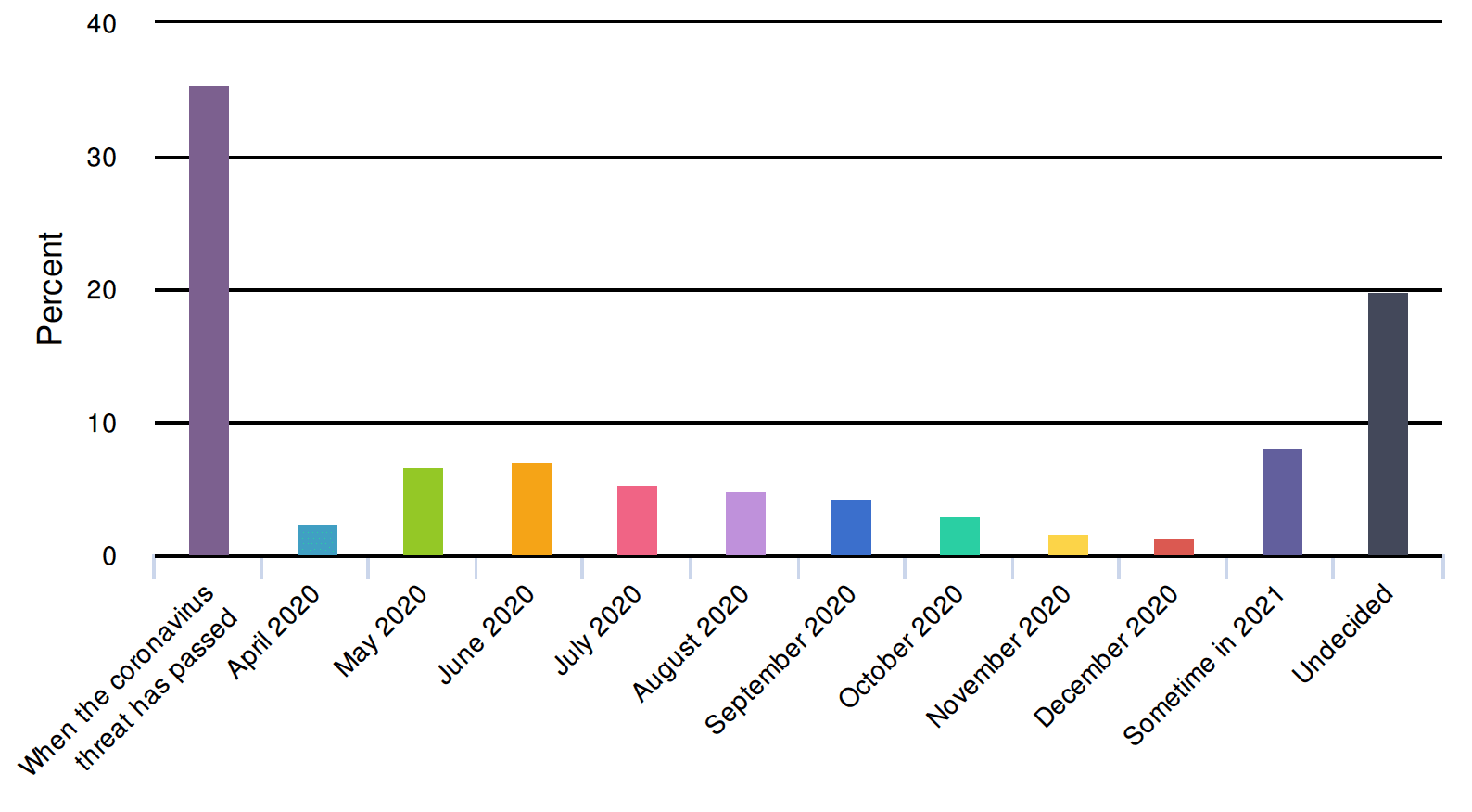

- Observation: For booking, 35% said after the virus has passed, 20% were undecided. Sometime in 2021 was chosen by 8%. Of those that chose a 2020 date, June was most popular, at 7%, followed by May at 6%. For traveling, 14% were undecided. June and July were the most popular answer of those that chose a date, with 8%.
- Data Comparison: For booking, “after the threat has passed” responses shrunk from 44% to 35%, with May and June picking up the most traction. For travel, this response decreased from 39% to 31%. This could be an indication that consumers realize that the threat will not pass completely until a vaccine or new effective treatment is found, or that the psychological need to take a vacation is growing while their movement is restricted due to local stay-at-home orders.
- Opportunity: People are feeling more confident about booking trips, but not as much ready to travel. Continuing to send messages that reassure guests of your flexible cancellation policies with some value added incentives to packages can be just the nudge people need to make that commitment to book now.
- Resource: We’ve put together a crisis recovery checklist to help guide you.
11. What is the first word that you think of when considering travel right now? & Before the coronavirus outbreak?


- Observation: For right now, there are still almost no positive words appearing at all on this list. Safety is, by far, the most popular concept. This is a huge change from pre-outbreak, where fun and excited were the most popular statements.
- Data Comparison: Hopeful was on the results of the last survey, but unfortunately, it hasn’t grown. While scary is the second most popular choice in both this survey and the previous one, the size has decreased for these results, which is very encouraging.
- Opportunity: People will remember how you make them feel during this crisis. People are uncertain of the future and are concerned for their safety now. What can you do to ease those sentiments? Can you bring some fun and excitement to them now?
12. Complete the following sentence: I will travel when:
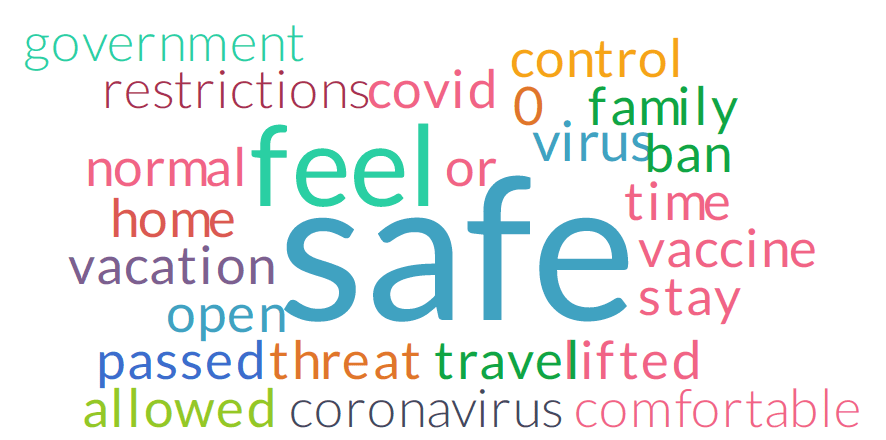
- Observation: Again, safety is most prevalent.
- Opportunity: As mentioned before, whatever you can do to assure visitors that you have their well-being as a priority will increase your chance in convincing them to stay with you.
13. Do you still intend to take a vacation in 2020 or 2021?
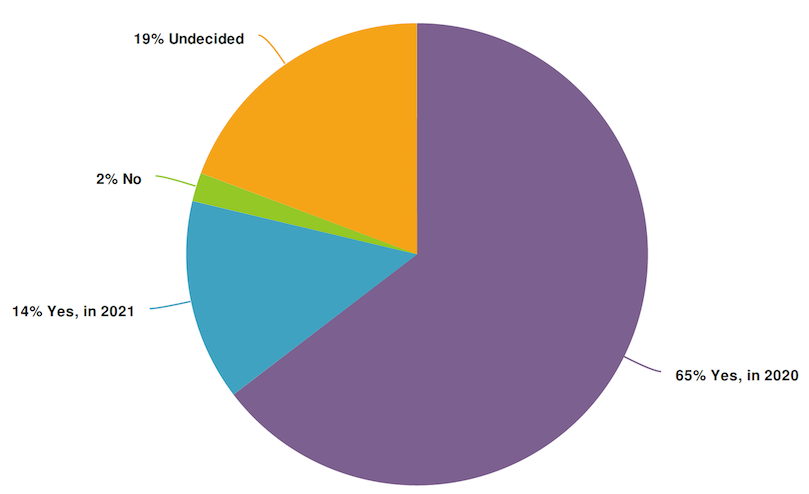
- Observation: With 65% saying yes in 2020 and 14% saying yes in 2021, consumers have not lost the desire to vacation. Most important, only 2% said that they had no desire to take a vacation.
- Data Comparison: Those saying yes increased from 60% to 65%.
- Opportunity: The pent-up demand is increasing, and will likely continue to increase as people are stuck in their homes for longer. Keeping your property top of mind now, so that people will think of you when they are ready to make travel plans should be your focus.
14. How likely are you to book a trip:
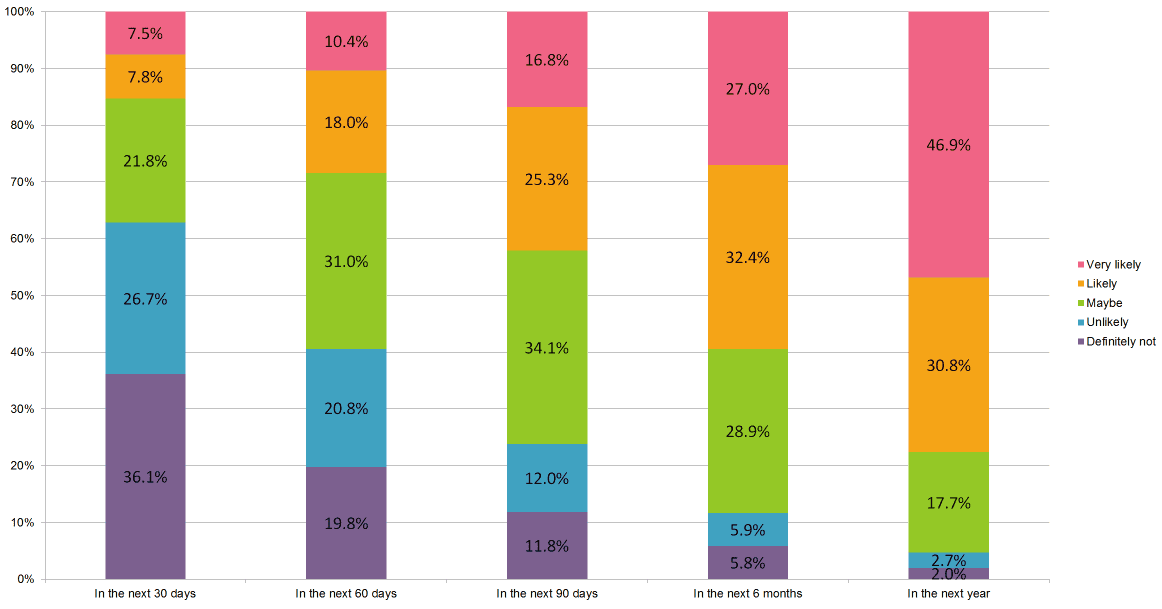
- Observation: There is low confidence to book a trip in the next 30 days, with 38% responding “maybe” or higher, but nearly 60% within 60 days.
15. Have you already booked your future stay?
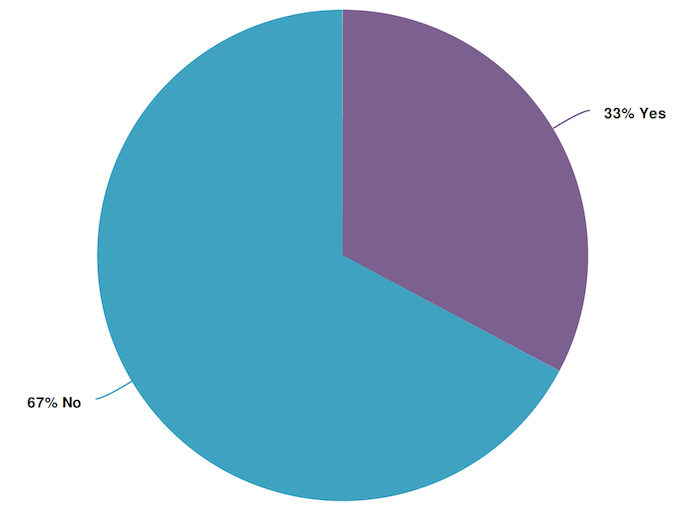
- Observation: While 33% of people do have an upcoming stay, 67% do not.
- Opportunity: Coupling this response with the previous insight suggests that many people are could be persuaded to book within 60 days
- Resource: Fuel put together this master resource list to help properties navigate these uncharted waters:Crisis Management Resources For Hotels Master List
16. What month is your future vacation scheduled for?
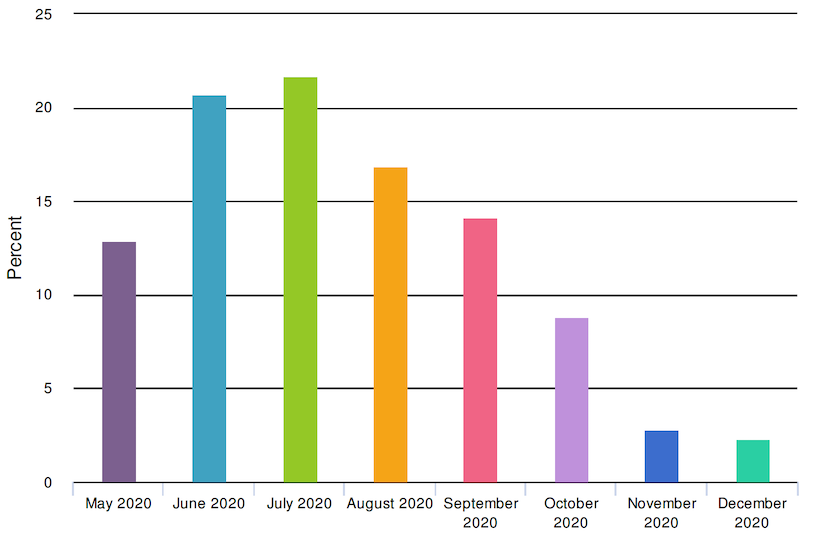
- Observation: Of those who have booked a trip, July is most popular at 22%, followed closely by June at 21%.
- Opportunity: This data corroborates the sentiment that people feel more comfortable committing to dates a bit further out. There is no reason not to be communicating summer packages to your guests at this time.
17. If you have stayed at a specific property before and you knew it was struggling financially, would you be willing to do any of the following to help? (Check all that apply)
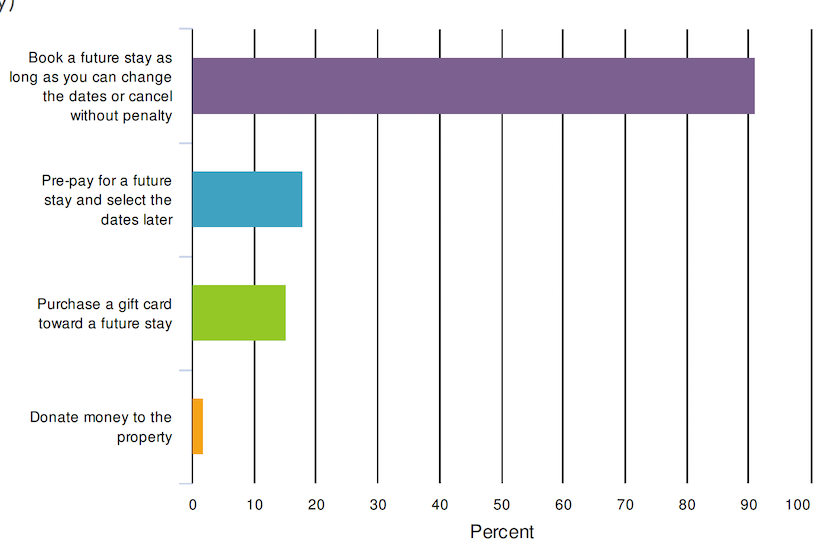
- Observation: Over 90% said they would book a future stay as long as they could change or cancel with no penalty! 18% would be willing to pre-pay for a future stay and select dates later.
- Opportunity: A focus on future stays is a logical conclusion, but don’t forget that those who have stayed with you in the past can be your best advocates. Utilize your social media platforms and consumer advocacy platforms like flip.to to have your guests share past experiences, encouraging their friends and family to consider your property as they plan their vacations too.
18. The government is sending every American a stimulus check to help during the coronavirus crisis. How do you intend to spend your stimulus check?
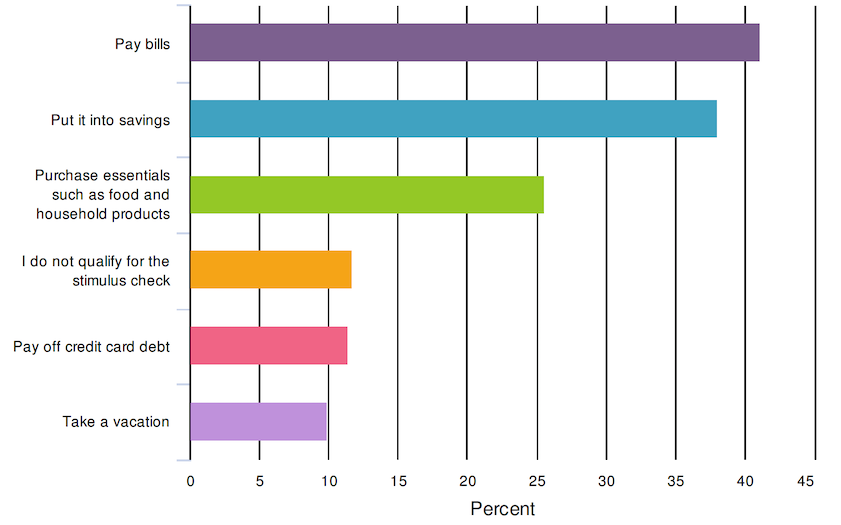
- Observation: Very few people (<10%) are considering spending their stimulus check on travel at this time. The majority of people are looking at paying bills (~41%), putting it into savings (38%), or buying essentials (26%).
- Data Comparison: There was an additional option to choose “I do not qualify for the stimulus check” on this survey, which received 11% of answers. Interestingly, in spite of that, taking a vacation increased slightly from 9% to 10%. All other answers came down a few percentage points each.
- Opportunity: In spite of the small increase in people saying they would use this money for vacation, people still have more pressing needs at the moment. Filing for unemployment has been at astronomical levels for the last few weeks, so keeping in mind that money will be tight for people for some time, there should be a focus on adding value to your packages. Look at incorporating things like free upgrades and food and beverage credits to encourage people to stay with you and help their pennies stretch further.
What's Next?
We will continue these studies, sampling the same database every two weeks. Our goal is to monitor trends in consumer behavior and to identify when recovery begins.
In the meantime, check out our COVID-19 and crisis management resources here.
Survey Methodology
This was a self-reporting survey sent to a database of leisure travelers located in North America. Questions containing multiple checkbox responses had the options randomized to avoid positional bias. Over 10,000 people participated in the survey, with over 8,000 completing all questions. Below are the demographic breakdown of respondents. Interestingly, the age range for this survey had a much older demographic than we typically see from our research. This may be an indication that the COVID-19 situation is more of a concern to people over 40.
Age & Gender:
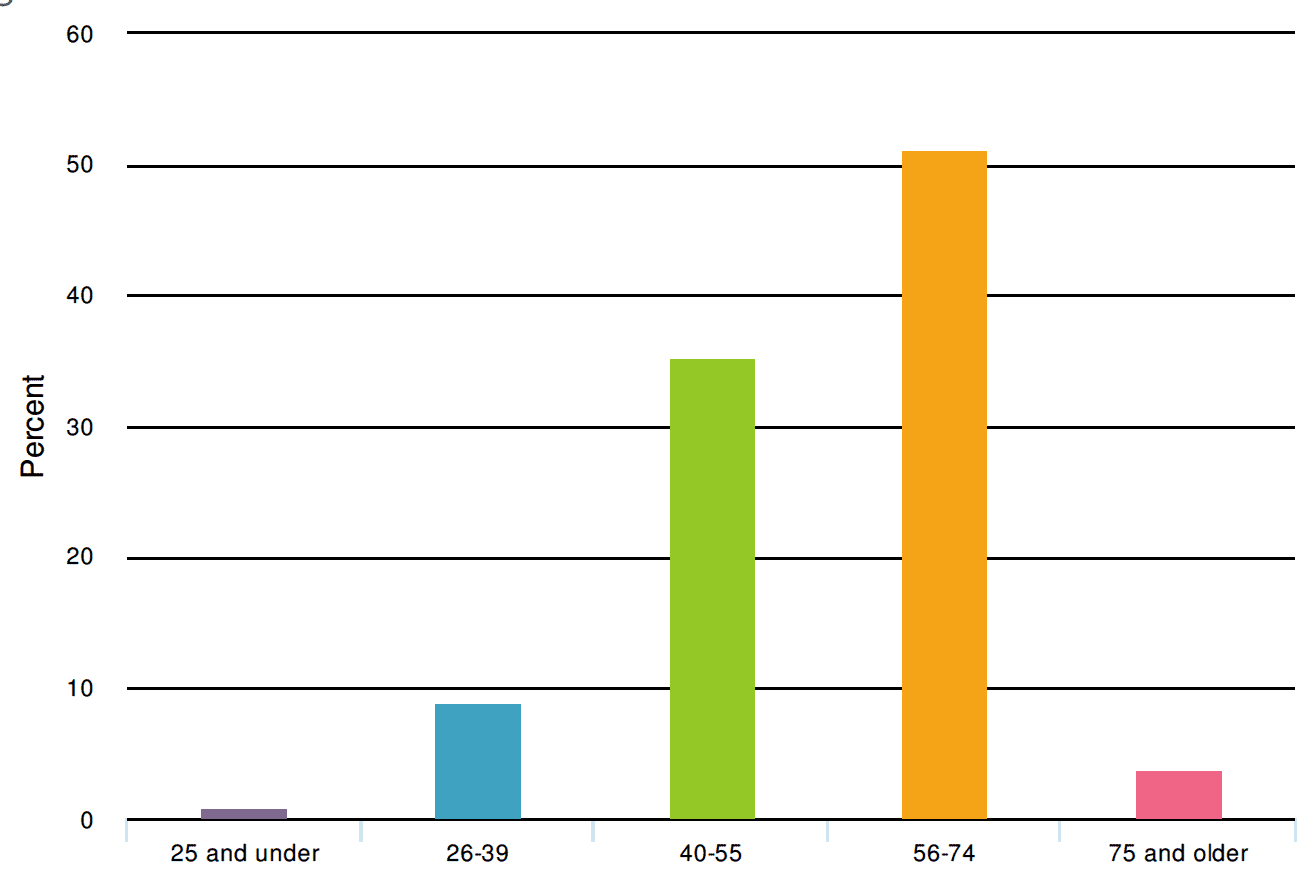

Do you have children living at home with you?
